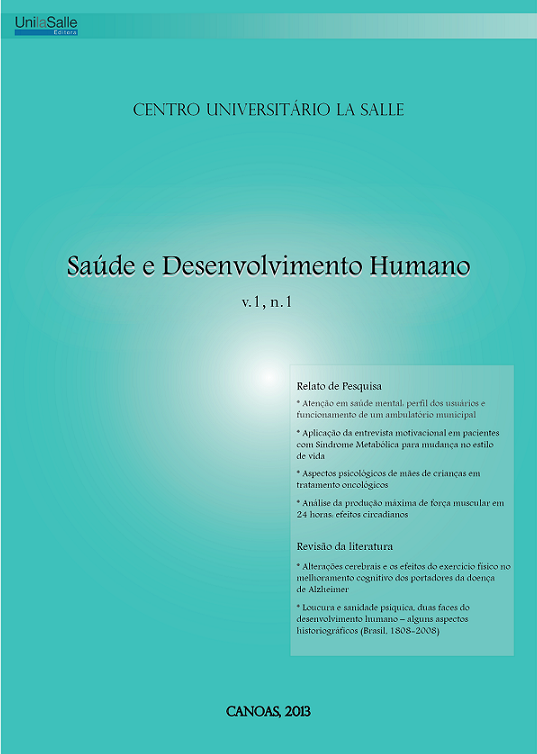Application of the motivacional interview in patients with metabolic syndrome for a change in lifestyle
DOI:
https://doi.org/10.18316/1029Keywords:
motivational interviewing, group intervention, metabolic syndromeAbstract
Motivational interviewing is a therapeutic approach that helps in changing behavior. It is a technique used to help the patient to recognize their problems and resolve their ambivalence directing them to behavior change. For this, the patient must adhere to the treatment and this task is not always easy. Thus, to motivate patients to change behavior becomes a challenge in clinical practice. Faced with this, the objective of this study is to analyze whether a therapist who performed service group seeking change in lifestyle in patients with metabolic syndrome was according to the motivational techniques of MI. The participants were twelve volunteers. The results indicate that the therapist was motivational in most part of interventions. Through this study the importance of the professional was verified, who uses MI to be in constant training due to the difficulty of motivating patients seeking to change their lifestyles.References
Castro MMLD, Passos SRL. Entrevista motivacional e escalas de motivação para tratamento em dependência de drogas. Rev. psiquiatr. clín. 2005; 32 (6): 330-335.
Andretta I, Oliveira MS. Efeito da entrevista motivacional em adolescentes infratores. Estud. psicol. (Campinas). 2008; 25 (1): 45-53.
Melo WV, Oliveira MS, Araújo RB, Pedroso RS. A entrevista motivacional em tabagistas: uma revisão teórica. Rev. psiquiatr. Rio Gd. Sul. 2008; 30 (1): 0-0.
Rollnick S, Miller WR, Butler CC. Entrevista motivacional no cuidado da saúde: ajudando pacientes a mudar o comportamento. Porto Alegre: Artmed; 2009.
Miller W, Rollnick S. A entrevista motivacional: preparando as pessoas para a mudança. Porto Alegre: Artes Médicas; 2001.
Proschaska JO, DiClemente CC. Transtheoretical terapy: Toward a more integrative model of change. Psychotherapy: Theory, Research and Practice. 1982; 19: 276-288.
Davidson R. Questões motivacionais no tratamento dos comportamentos aditivos. In Edwards G, Dare C. Psicoterapia e tratamento das adições Porto Alegre: Artes Médicas; 1997.
Proschaska JO, DiClemente CC, Norcross JC. In Search of how people change: applications to addictive behaviour. American Psychologist. 1992; 47: 1102-1114.
Proschaska JO, Velicer WF, DiClemente CC, Fava J. Measuring processes of change: applications to the cessation of smoking. Journal of Consulting and Clinical Psychology. 1988; 56(4): 520-8.
Melo WV, Oliveira MS, Ferreira EA. Estágios motivacionais, sintomas de ansiedade e de depressão no tratamento do tabagismo. Interação em Psicologia. 2006; 10 (1): 91-99.
Range BP, Marlatt GA. Terapia cognitivo-comportamental de transtornos de abuso de álcool e drogas. Rev. Bras. Psiquiatr. 2008; 30 (II): S88-95.
Szupszynski KPDR, Oliveira MS. O modelo transteórico no tratamento da dependência química. Psicologia: Teoria e Prática. 2008; 10 (1): 162-173.
Bundy C. Changing behaviour: using motivational interviewing techniques. Journal of the Royal Society of Medicine. 2004; 9 (44): 43-47.
Rogers C. Psicoterapia centrada en el cliente. Barcelona: Paidos; 1986.
I Diretriz Brasileira de Diagnóstico e Tratamento da Síndrome Metabólica. Arq Bras Cardiol. 2005: 84 (1): 3-28.
Lizarraga S, Ayarra M. Entrevista Motivacional. Anales Sis San Navarra. 2001; 24 (2): 43-53.
Assis MAA, Nahas MV. Aspectos motivacionais em programas de mudança de comportamento alimentar. Rev. Nutr. 1999; 12 (1): 33-41.
Dimatteo MR. Enhancing patient adherence to medical recommendations. Journal of the American Medical Association. 1994; 271 (1): 79-83.
Dishman RK. Advances in exercise adherence. Champaign: Human Kinetics; 1995.
Downloads
Published
Issue
Section
License
Authors who submit their manuscripts to be published in this journal agree to the following terms:
- Authors retain copyright and grant the journal right of first publication with the work simultaneously licensed under the Creative Commons Attribution License that allows the sharing of work and recognition of its initial publication in this journal.
- By virtue of the articles appearing in this open access journal, articles are free to use, with proper attribution, in educational and non-commercia.


